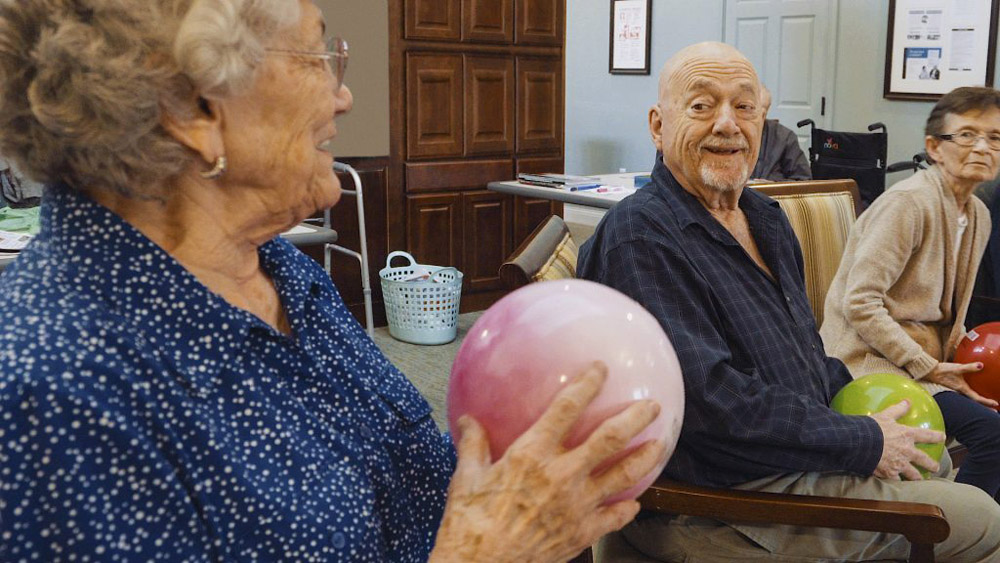Leading Benefits of Memory Care: A Helpful Environment for Senior Citizens
Memory care facilities use an organized and supportive setting tailored particularly for senior citizens with cognitive impairments. These specialized settings not just boost safety and security and security yet likewise offer individualized care plans that cater to specific demands. Engaging social activities and experienced team add to improved psychological health and wellness and cognitive stimulation, cultivating a feeling of neighborhood. As families look for reassurance concerning their liked ones' wellness, the worth of these programs ends up being increasingly noticeable. Comprehending the full range of benefits needs further exploration right into exactly how memory care really changes lives.
Improved Safety and Security
Among the most substantial advantages of memory care centers is their boosted security and security functions, made particularly to shield individuals with cognitive disabilities. These facilities prioritize the health of residents by incorporating a selection of precaution that reduce dangers related to wandering and mishaps. Safe and secure environments usually include kept an eye on access and leave points, guaranteeing that citizens can not leave the properties not being watched, which significantly minimizes the threat of obtaining lost or encountering harmful situations.Additionally, memory care facilities are furnished with emergency situation response systems, such as call buttons and alert systems, enabling homeowners to quickly look for assistance when needed. Employee are trained to acknowledge the special difficulties dealt with by individuals with memory-related conditions, enabling them to react promptly and properly to emergencies.Moreover, these centers usually include designs that lessen confusion, with clear signage and acquainted setups that aid in navigation. The visibility of experienced caretakers around the clock even more improves citizens' security, offering reassurance to both individuals and their family members. On the whole, the detailed security and safety steps in memory care facilities develop a helpful atmosphere where homeowners can prosper while reducing potential dangers.

Personalized Care Plans
Because each individual with memory disability has one-of-a-kind demands and difficulties, customized care plans are a fundamental component of reliable memory care. These tailored plans are diligently crafted by a group of health care professionals, consisting of medical professionals, registered nurses, and caregivers, that team up to examine the particular requirements of each homeowner - Memory Care Charlotte. By concentrating on individual preferences, case history, and cognitive capabilities, personalized care plans assure that locals obtain the appropriate level of support.A vital aspect of these plans entails regular assessments and changes based upon the local's altering problem. This vibrant approach allows caregivers to customize treatments, treatments, and day-to-day routines, consequently maximizing the efficiency of care. Furthermore, individualized care plans boost the lifestyle for locals by including their passions and advertising freedom, allowing them to participate in tasks that reverberate with their individual histories.The execution of these strategies cultivates a feeling of security and trust, as residents and their families feel great that their specific needs are being addressed. Ultimately, personalized care strategies not just sustain the physical wellness of individuals with memory impairment yet additionally add meaningfully to their psychological and mental health, creating a holistic care setting
Engaging Social Activities
Engaging social tasks play a vital role in boosting the general well-being of people with memory impairment, enhancing the personalized care strategies developed for their unique requirements. These activities cultivate connections amongst residents, providing possibilities for socializing, which is essential for psychological health and cognitive stimulation.Participating in team tasks can help in reducing feelings of isolation and isolation that numerous elders experience. Structured experiences, such as art classes, music treatment, or reminiscence sessions, motivate not just interaction yet likewise the expression of creativity and individuality. Such interactions can considerably boost mood and boost general life satisfaction.Moreover, involving social activities can stimulate cognitive feature by promoting mental engagement and focus. Gamings, puzzles, and team conversations test locals' thinking abilities and memory recall, aiding to preserve cognitive capacities for as lengthy as possible.Additionally, these activities commonly include physical movement, which is advantageous for general wellness. Mild workouts or dancing can boost physical health while fostering a sense of community among participants.
Specialized Memory Support
Specialized memory support is vital for people encountering cognitive obstacles, as it resolves their one-of-a-kind demands via customized treatments and methods. This customized care concentrates on numerous types of memory disability, including Alzheimer's illness and other dementias, making certain that each resident obtains the focus and solutions needed for their certain condition.Key aspects of specialized memory support include individualized care strategies, which are established through comprehensive assessments of private capabilities and choices. These plans may entail cognitive therapies developed to enhance memory retention, interaction, and daily living skills. Additionally, personnel in memory care facilities are educated to utilize effective interaction methods and behavioral monitoring methods that promote an encouraging environment. Alzheimer’s Care.Furthermore, specialized memory assistance typically integrates structured regimens and engaging tasks that advertise cognitive stimulation and social communication. This not only boosts the lifestyle for homeowners however additionally assists to reduce stress and anxiety and complication associated with cognitive decrease. By prioritizing a caring and recognizing method, specialized memory assistance creates an environment where people can flourish regardless of their challenges, eventually bring about improved psychological health and a sense of function in their day-to-days live
Family Comfort
For family members of individuals with cognitive disabilities, the tranquility of mind that comes from understanding click here to read their enjoyed ones are receiving specialized care can be very useful. Memory care facilities supply a safe and secure environment tailored to the special demands of elders with Alzheimer's, dementia, and other cognitive difficulties. This specific care permits family members to feel great that their loved ones are in capable hands, benefiting from qualified personnel that comprehend the intricacies of memory-related conditions.The structured regimens and appealing activities provided in memory care settings not only enhance the lifestyle for citizens yet additionally relieve the stress and anxiety and stress typically experienced by family participants. Recognizing that their enjoyed ones are participated in significant interactions and receiving personalized attention can greatly reduce anxiousness for families.Additionally, memory care centers usually give family members with sources and support, including therapy and instructional programs. This equips households to much better recognize their liked one's condition and browse the difficulties connected with it. Ultimately, the mix of expert care, a caring setting, and family members support fosters a complacency, allowing family members to focus on cherishing their time with each other without the burden of consistent worry.
Regularly Asked Concerns
What Qualifications Do Memory Care Team Member Commonly Have?
Memory care personnel participants usually have specialized certifications to effectively support people with cognitive disabilities. The majority of have finished training in dementia care, typically holding certifications in gerontology or an associated area. Additionally, lots of employee have backgrounds in nursing, community service, or psychology, enabling them to give considerable psychological and physical support. Continuous education in the most recent care techniques is likewise typical, making certain staff stay notified concerning best practices in memory care.

Exactly How Do Memory Care Facilities Handle Clinical Emergencies?
Memory care centers are geared up to manage medical emergency situations through educated team and recognized methods. Team member usually obtain training in emergency treatment, MOUTH-TO-MOUTH RESUSCITATION, and particular treatments for handling wellness crises connected to cognitive problems. Memory Care Charlotte. Facilities commonly team up with neighborhood clinical solutions to assure quick feedback times - Alzheimer’s Care. Additionally, they maintain extensive health records for residents, allowing for swift recognition of clinical demands and proper treatments during emergency situations, thereby ensuring homeowners' health and security
Are Visitors Allowed at any moment in Memory Care?
Visitation policies in memory care facilities differ by facility. Typically, many facilities urge friends and family to go to locals, fostering link and support. Certain going to hours might be carried out to guarantee the safety and security and wellness of all residents. Facilities usually prioritize organized interactions to minimize interruptions to daily regimens and therapeutic tasks. It is advisable for site visitors to consult the center regarding their certain visitation guidelines and any type of potential limitations.
What Kinds of Therapies Are Used in Memory Care Communities?
Memory care areas usually supply a range of healing interventions tailored to sustain people with cognitive impairments. Common treatments include cognitive excitement treatment, art and songs therapy, and reminiscence treatment, which urge engagement and emotional expression. In addition, physical treatment may be offered to boost mobility, while work treatment concentrates on day-to-day living skills. These structured tasks intend to advertise cognitive function, improve mood, and foster social connections among citizens, developing a holistic approach to care.

Exactly How Is Medication Administration Conducted in Memory Care?
Drug management in memory care neighborhoods is performed with an organized approach to ensure the safety and security and well-being of citizens. Educated team member look after the administration of medicines, sticking to suggested does and schedules. Routine analyses are executed to monitor effectiveness and possible adverse effects. Additionally, caregivers maintain clear communication with health care carriers and households, ensuring that any kind of changes in health status are quickly resolved, thereby optimizing the general care process for individuals with cognitive disabilities.
Comments on “Personalized Dementia Care: Tailored for Individuals”